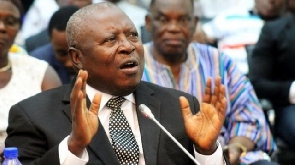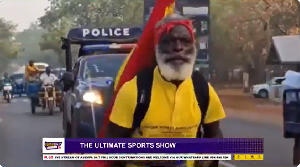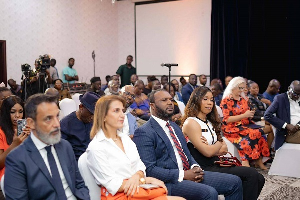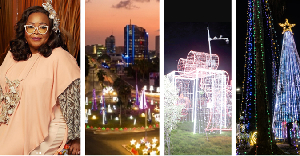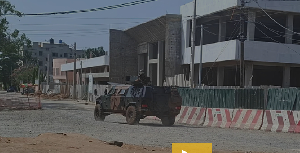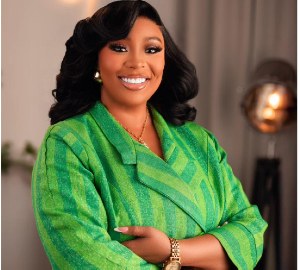The press conference by the NPP (Chronicle /Ghanaweb May 14, 2008) in response to the press statement of NDC candidate Prof. John Atta Mills, is worth commenting on. The title itself was very well chosen to attract readers: “We are not Drug Dealers, NPP”.
No political party or human organization for that matter, likes to be associated with illegal drug trafficking. During the Millennium TV series shown on CNN in the US, there was one King or leader in India in the 16th or 17th century, who had prevented his people from engaging in the Opium trade, and the sad issue I recollect was that the British used force to have him removed for standing against a trade that was profitable at the time for their merchants.
It is true there have been many unresolved accusations, speculations and public perception that many key NPP high-ranking members are engaging in the illegal drug trade. Public perceptions is that the police hierarchy are implicated. However, as Mr. Mac Manu indicated, “the NDC regime hid many drug related cases from the eyes of the public, but NPP has so far not done that” (Mac Manu, Chronicle /Ghanaweb, 2008, May 14).
No matter the opinion of the NPP of the NDC, the sad facts are that the NPP is the current ruling government and it appears in the public domain that the government has a very weak enforcement system for not only drug trafficking, but in the enforcement of laws in general. Ghana expects to move forward, not backwards or at a standstill. Interview of a significant number of Ghanaians would indicate that lack of discipline seems to show up in many areas of Ghanaian life under the NPP. It demonstrates either complicity by high officials, or weak enforcement at the Attorney Generals office and the Police Departments. The President, unfortunately seems to have no clue, or to live under the greatest delusion that everything is fine. For an Oxford educated Lawyer, our President’s concept of the practice of democracy seems weak and hazy, and at best limited to some progress in human rights and free speech.
COMPARISON
In the pres statement, we read: “Mac Manu also expressed surprise at the comments made by the NDC vice Presidential candidate, Hon. John Dramani Mahama that comparison of records was a sign of mediocrity”.
Without having to dissect the whole speech of Hon. John Dramani, one may tend to agree with Peter Mac Manu that comparison is not a simple sign of mediocrity. In fact comparison is the first element of critical analysis in any strategic implementation of any Vision. Even in Science and Engineering developmental projects, one examines what others have done and then builds on it to improve it. As such it is legitimate indeed in any human endeavor for the NPP to compare their record with that of the NDC on various issues such as crime enforcement, the drug problems, security, freedom of the people, actual delivery of public service and utilities such as water, and problem resolution performance such as the health delivery issues and even the design and implementation of the NHIL. As this writer mentioned on our GLU (Ghana Leadership Union) forum last week, the NHIL is one of the most creative designs for a society where tax collection strategies have eluded leaders for decades. The NPP should therefore be given the credit if it is indeed their creation.
PERFORMANCE to EXPECTATIONS
Having said these above, one must note that the success of any society and the performance to expectations does not lie in comparing one party to another or one government to another. In this writer’s PhD dissertation research survey conducted in the Accra-Tema metropolitan area of Ghana between 2004 and 2006, also published in a recent book, it was revealed that the dissatisfaction of people in the government delivery of services (water, garbage, electricity and telephone services) was very high, ranging round 70%. Whiles many showed conflicting answers and did not want to put blame on the government of their choice, when the question was asked about the last 5 to 10 years (without mentioning any political party’s name), most indicated a comparison that was interesting to note. Some Ghanaians have a tendency not to verbalize on their pain as much when a party of their choice is concerned. This is a weakness that this writer can attribute to culture (Danso, K.A., Leadership Concepts and the Role of Government in Africa: The case of Ghana, 2007).A recent report by one Richard Obeng Mensah of the Law Faculty at KNUST points out examples of cultural hypocrisy in Ghana in an article entitled “Hypocrisy is Killing us” and he concludes that “hypocrisy is indeed consuming the whole Ghanaian society. Blame game has become the cherished sport that even children in our society can skillfully play” (Ghanaweb, April 30, 2008). In a society with this kind of culture, how does a foreigner deal genuine business with partners? Does it surprise anybody that men who get into higher offices will accept to be paid a wage only a small percentage of their expected standard for their qualifications, sometimes below living wage, and yet able to feed their families and send their kids to school overseas. It is not unexpected that distrust will emerge in any society where leaders act with hypocrisy.
We must note that hypocrisy usually leads to cover-ups, and can lead eventually to criminal fraud, as people in higher office make business deals and allow contractors to simply siphon public funds and not perform and deliver services. Case in point is the East Legon road, which since 2004 has been built and washed away four times. Many Ministers of government live in this area, and one only wonders what kind of decayed mindset happens to educated Ghanaians when they get into power. President Kufuor for example reported that his salary on assumption of office was equivalent to $287 and yet he is reported to have made sizable investments in hotels and businesses through surrogates, and made hundreds of thousands of dollars through travel per diem allowances. The executive had still not revealed what the per diem allowances of the President and his Ministers are.
In a comment on Ghanaweb to the referenced article somebody wrote: “How many times will it take the NPP to respond to the NPP campaign launch. In any case i think the NPP got the John Mahama statement totally wrong. As a people i believe we should measure the performance of any government according to the needs, resources at its disposal and the achievements againsts the needs and resources at its disposal. We are tired of all these nonsense. (Osei Prepeh, Ghanaweb Comments, 2008-05-14 08:43:31)
THE CULTURE There is an African culture that unfortunately comes across to others as not helpful towards this world of competitive progress. Many Africans one meets exhibit this culture. There is a tendency to accept life as is and even justify it when we know we could have done better. Of course those of who came to the West embody many exceptions to this rule and have a very higher achievement rate even compared to members of their host nations in the West. In many cases many Africans defer effective problem resolution efforts and enforcement of discipline to the theory this writer has called the fama-Nyame (give-it-to-God) principles. We have a weak enforcement culture and that can be debilitating in any confrontational situations, in business as in life. As African American writer Keith Richburg wrote in his book:
“I do not hate Africa or the Africans. What I hate is the senseless brutality, the waste of human life. I hate the unfairness, the injustice, the way repressive systems strip decent people of their dignity. I hate the way my driver in Somalia passes a starving woman on the roadside and will not stop to let me give her a bottle of water. I hate the kids swaggering outside the gates of the feeding center with machine guns on their shoulders, thrashing the old people waiting in line for handful of gruel… I hate the immigration clerk at the dusty border outpost who is officiously studying my passport he is holding in one hand while the other hand is stretched out, waiting for a bribe… Perhaps more than all that, I hate this maddening propensity of Africans to wallow in their own suffering, to simply roll over when kicked, and to express unswerving faith that some outside force, some divine intervention, will bring deliverance from their misery” (Keith Richburg, Washington Post Reporter. Author of “Out of America: A Black Man Confronts Africa”, Harcourt, Inc. 1998).
The WEAKNESS
Having noted the weakness in our society and culture, one then notes that to find lasting societal solutions, a comparison with some other societies is imperative. All developed societies share information through technical and other conferences and publications in journals shared by all. African culture seems to lack this collaborative sharing. There is a tendency rather for many to depend on one who climbs of an economic gutter than for collaborative effort towards common goals. This manifests itself also in our business set up. An examination of the businesses of the rich Kwahu, Asante and other people in Ghana will show that almost all of them are sole proprietorships. The only corporations are usually foreign, or a continuation of the corporations set up during the Nkrumah era, such as SIC and SSNIT.
This culture manifests itself in a weakness in international business. A good example is the close down of Ghana International Airlines by Presidential Chief of Staff Kwadwo Mpiani, in a ridiculous show of brutal and illegal force. In Euro-Caucasian cultures, information is shared whiles competing for human and material resources as well as scientific and technological breakthroughs, using patents and copywriting. Of course we know there are sometimes corporate espionage, as some Japanese companies were accused of by American companies in the 1960s and 1970s. If we in Ghana and Africa are to develop and catch up, we cannot avoid comparison and we cannot avoid cultural shift in mindset and paradigm shift, as many have pointed out.
However this writer believes that the comparison should not be to other African countries that may be at the very bottom of human existence and survival, of wars and famine and brutality. Ghana was a first in African in 1957 and that leadership must be maintained in doing the right thing and applying the Western education and experience and exposure we have learnt for the last half century. In a recent article a reader commented that since I had indicated in a previous article I owned a house and flats in East Legon I was renting, I was an elite and some even started hate words implying that I perhaps looked down on poor Ghanaians and had not paid my taxes and was expecting the government to deliver water. Whiles such personal comments of the ignorant is part of free speech, what education should teach us all is that open dialogue, when encouraged across generations as this writer has done through our GLU forum for man years, is part of sharing organizational culture. It must be remembered that such dialogue exchanges is a benefit to the generation behind as we build organizational learning towards passing something to the youth behind. This is done in Western culture and we need to learn this.
In my book I dedicate a chapter or more in comparison of our Ghanaian culture with Euro-American and Asian-Confucian cultures, and even correlate these attributes as discipline to corruption perception indices and economic and human development indices, and how potential investors evaluate such factors (Danso, K.A., 2007, Ch.4, 15, 16).
TELLING THE TRUTH
In this writer’s opinion, telling the truth is the best way to achieve success, both at the personal level and organizational level. Many who are old enough, and share experience about doing business in Ghana and dealing with Ghanaians in this post 1970s “modern” era, lament over the “good old days” of Ghana. Almost everybody in Ghana these days, starting from the President down, seems to be officially living below the living wage. (Note the word “officially”). When some of us were growing up and in high school in the 1960s, we were motivated to study hard and achieve due to the culture we saw. In the 1960s, any graduate teacher or Certificate A teacher, medical doctor or nurse did not have to form a side-business in order to survive and make enough money to buy a car. There is no doubt that the economic deterioration of the 1970s has had major impacts in changing our culture.
A case study comparison can be made with the writer’s own experience in running a business in America as well as in Ghana in the last 20 years. Whiles running business in America is not without its risk of customer fraud, the percentage of fraudulent and deceitful cases is far too high in the Ghana case to mention here. Our culture has changed and the Ghanaian concept of image and shame seem to have shifted as Economic realities make members of families lie and cheat and engage in acts of fraud they perceive as survival strategies. In the 1970s the term kalabule was coined for such behavior.
It is in view of this writer that the NPP being taken to task and the press conference message is important for Ghanaians. It is not necessarily what Prof. Atta Mills says that should be of concern. Any group’s perception of themselves and the image they portray depicts their character. The pres release reported: “On the issue of corruption, Mr. Mac Manu said the NPP has passed laws on public procurement and financial management whist holding the first ever Public Accounts Committee of Parliament hearing in public. This, he said was evident in Nana Akufo-Addo’s pronouncements last month to the effect that his government will fight corruption vigorously” (Ghanaweb, 2008, May 14).
What the NPP does not realize is that it is not what is written that is the issue. It is the enforcement of laws and rules that builds organizational or national character. Ghana has had many laws since Independence, and there is nobody in Ghana who does not know that corruption, which is simply the art of self-enrichment whiles engaged in public office, is a crime. It was with shock that this writer read that some members of the NPP such as Dr. Kofi Apraku, were defending the purchase of Presidential jets at $105 million, at a time when roads cannot be widened for workers and drivers to travel 8 miles from the suburbs to Accra in three hours, and water is being rationed despite loans and grants in excess of $603 million! This is absolutely no excuse in the world for such mismanagement by the NPP!
Let us remember that whether Prof. Atta Mills statements dealt with drugs, corruption or other national issues, the burden of non-delivery and poor job performance all fall directly on the shoulders of the both the NDC and the NPP (in a ratio of about 19 NDC to 7 NPP if time is used as a factor).
As Obeng Mensah points our in his article, hypocrisy has many negative factors. Again Keith Richburg writes:
“But I am tired of lying. And I am tired of all the ignorance and hypocrisy and the double standards I hear and read about Africa, much of it from people who’ve never been there, let alone spent three years walking around amid the corpses. Talk to me about Africa and my black roots and my kinship with my African brothers and I will throw it back in your face, and then I’ll rub your nose in the images of the rotten flesh” (Richburg, K.B.,1998, xvi)
BEING OBJECTIVE
It is hard to be the founder of a political party and at the same time remain objective on such matters. However, that is what distinguishes scholars from ordinary men. As a co-founder of GNP, the new Political party initiated overseas, Ghana National Party will not attribute motives and speculations but simple observe the facts that enforcement of crimes in Ghana has not been at the expectation of the general public. Again in this writer’s research we showed that even in the best parts of Ghana, the large majority of Ghanaians are dissatisfied or highly dissatisfied with the performance of government.
Having said that I must admit that this press conference was a showpiece press statement and many may agree the NPP has perhaps set Ghana on a better path than what the 19 year rule of the illegal PNDC and it’s continuity NDC did.
However, why should Ghana, a young nation, be saddled with only 2 non-performing and disgraced party choices, one of them being an illegally organized continuation of a dictatorship, an accident of fate and intimidation, and one being an anti-development and anti-Nkrumah party metamorphosed as NPP?
Weren't most of the elders in the NPP against Nkrumah's developmental plans and in fact supported illegal overthrow of him? Granted that the young men like Mac Manu were born into the tradition and may not have direct experience of the hatred between the NPP /UP tradition and the CPP traditions, one should not forget that parties are being judged by their standards today. To quote singer actress Janet Jackson, many are asking “what have you done for me lately?”.
So why should Ghanaians have only these 2 choices, both of them saddled with heavy corruption and public thievery allegations, and mismanagement. When was the last time a prosecution of public crimes occurred? Did the NPP investigate the fraudulent Ghacem cement reports? Did the NPP investigate the fraudulent contracts or sale of government assets and contracts to date such as the Ghana Telecom or Ghana Water to foreigners? Huge sums of money for water have still not been accounted for and yet the Ghana Water is supposed to be sold to foreigners. Would any intelligent group obtain a loan for a company and then lease the management out to others? The management of the Ghana Telecom, a company that has made private companies a profit from the Ghanaian payers of more than $2 Billion since inception, indicates the failure of government to deliver intelligently, even if they do not include the malice and corruption component.
A COMMON VISION for GHANA
Whiles we may be members of different political parties, let us not forget the words of the founding father of Ghana.
“Divided we are weak; united, Africa could become one of the greatest forces for good in the world. I believe strongly and sincerely that with the deep-rooted wisdom and dignity, the innate respect for human lives, the intense humanity that is our heritage, the African race, united under one federal government, will emerge not as just another world bloc to flaunt its wealth and strength, but as a Great Power whose greatness is indestructible because it is built not on fear, envy and suspicion, nor won at the expense of others, but founded on hope, trust, friendship and directed to the good of all mankind.” (Kwame Nkrumah - African Must Unite, 1961)
This writer believes that Nkrumah’s concept of African unity should be evaluated in context. In 2008 we have seen how Europeans (I almost said European tribes) have joined together to become a power bloc of trade to challenge America. At the same time even America has tried to combine North America under common trade bloc. African dos not need to have one huge “Socialist looking” government under one leadership. No! That vision is way past and this writer will not endorse it as workable format. However, a carefully managed system as American has done for their 50 States is what is recommended. As much as we the educated write nice constitutions, neither the NDC nor the NPP have had the executive management skills to launch this decentralization program that empowers districts and towns to form their own economic entities and compete. Fifty years after independence, rural hospitals in both the poor areas as well as in rich areas like my won Abetifi are expecting somebody form Accra to send somebody to design a budget, collect taxes and hire competent city Manager, Engineers and administrators as done in the West!
Left to this writer alone, candidates for the Presidency will stop attacking each other and issue forth their actual detailed strategic plans on how they would solve the various public problems of traffic and transportation, water, sanitation, poor and unstable deliver of electricity, poor behind-the-times communication systems as well as have time to study and tell the people where the $603 million on grants and loans for water went, and now Ghana got to be in debt at $8.2 Billion according to the Governor of the Ban of Ghana.
Based on this writers studies and published analysis in the last 4 years, these are what the people of Ghana want to hear about.
Prof. Atta Mills of the NDC should define, elaborate and publicize his plans and his strategy for dealing with these known problems and how he will deliver actual measurable performance, and show concern for the people of Ghana. Nana Akuffo Addo of the NPP, Dr. Kwesi Nduom of the CPP, Dr. Mahama of the PNC (merged or not?), Ofori Ampofo of the GNP, Kwesi Amoafo-Yeboah and other candidates, should start articulating how they will solve the problems of the people of Ghana. It is through public articulation that the people can hold them responsible if and when they become our leaders, and not after.
Cheers,
Kwaku A. Danso, PhD
k.danso@comcast.net


